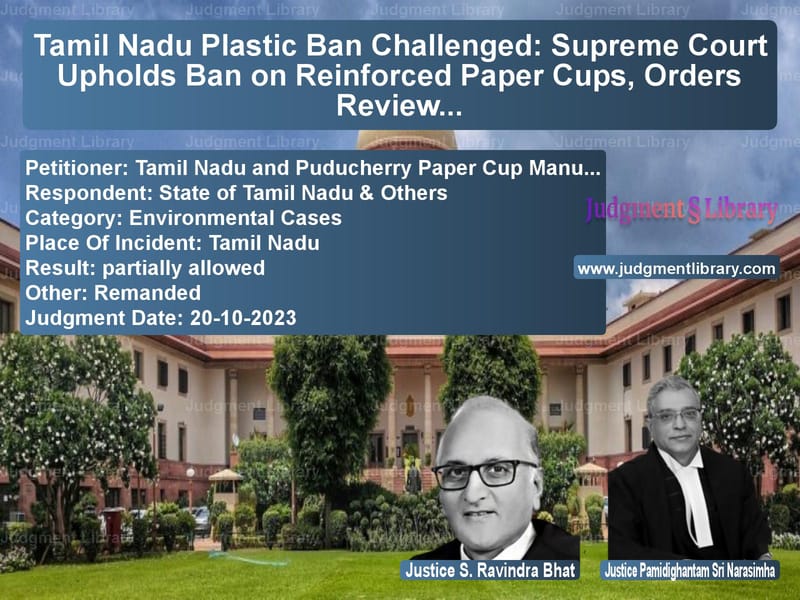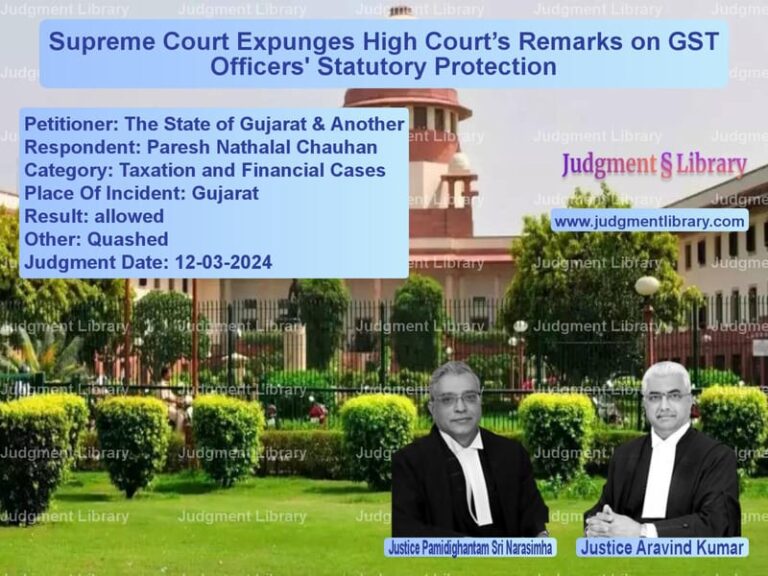Tamil Nadu Plastic Ban Challenged: Supreme Court Upholds Ban on Reinforced Paper Cups, Orders Review of Non-Woven Bags
The case of Tamil Nadu and Puducherry Paper Cup Manufacturers Association v. State of Tamil Nadu revolves around the challenge to the Tamil Nadu government’s ban on single-use plastic products, including reinforced paper cups and non-woven plastic bags. The Supreme Court upheld the ban on paper cups while directing a fresh review of the ban on non-woven bags, considering amendments in national regulations.
Background of the Case
The Government of Tamil Nadu issued a Government Order (G.O. Ms No. 84) under Section 5 of the Environment Protection Act, 1986, on June 25, 2018, which came into effect on January 1, 2019. This order banned the manufacture, storage, transport, sale, and use of single-use plastics such as carry bags, disposable cups, straws, and water pouches. The appellants, representing paper cup and non-woven bag manufacturers, challenged the ban in the Madras High Court, which upheld the government’s decision. Dissatisfied with this ruling, they approached the Supreme Court.
Arguments by the Petitioners
The appellants contended that:
- The ban was imposed arbitrarily without adequate scientific backing.
- Reinforced paper cups contain 94% paper and only 6% LDPE (Low-Density Polyethylene), making them recyclable.
- Other states such as Maharashtra, Karnataka, and Odisha had not imposed a similar ban.
- The economic impact of the ban was severe, affecting over five to six lakh workers.
- The mandatory consultation process required under Rule 4 of the Environment Protection Rules, 1986, was not followed before issuing the ban.
For non-woven plastic bags, the appellants argued:
- These bags are made of polypropylene fibers, are reusable, and do not choke drainage systems.
- They biodegrade under sunlight and are considered eco-friendly.
- The government did not provide scientific proof to justify their inclusion in the ban.
- There was a disproportionate impact on small-scale industries, violating Article 19(1)(g) of the Constitution.
Arguments by the Respondents
The State of Tamil Nadu defended its decision, stating that:
- The ban was imposed under Section 5 of the Environment Protection Act, which empowers the government to regulate industries to protect the environment.
- Reports from the Central Institute of Plastic Engineering and Technology (CIPET) confirmed that reinforced paper cups were non-biodegradable due to their LDPE coating.
- Non-woven polypropylene bags were classified as plastic and did not decompose fully, leading to microplastic pollution.
- Judicial review over policy decisions such as environmental bans should be limited.
Supreme Court’s Observations
The Supreme Court carefully examined the arguments and evidence presented by both sides. On the issue of reinforced paper cups, the Court ruled:
“That these cups are indiscriminately used and thrown, as a single-use product—requires no statistics. By composition itself, they are non-biodegradable, and there is immense difficulty in their recycling, as it requires appropriate collecting mechanisms, strict segregation, to name a few of the challenges.”
Read also: https://judgmentlibrary.com/supreme-court-upholds-closure-of-polluting-slaughterhouse-in-rajasthan/
Regarding non-woven plastic bags, the Court noted that these bags have some level of reusability and recyclability. It observed that recent amendments to the Plastic Waste Management Rules, 2016, introduced a minimum GSM (gram per square meter) requirement for such bags instead of an outright ban. The Court ruled:
“Given that the amended 2016 Rules now allow non-woven bags above 60 GSM to be manufactured and used, i.e., the Centre has found a way to regulate it, rather than ban it—there is some merit in the appellant’s contention regarding disproportionality.”
Final Judgment
The Supreme Court ruled:
- The ban on reinforced paper cups was justified and would remain in effect.
- The case of non-woven plastic bags would be remanded to the Tamil Nadu Pollution Control Board (TNPCB) for reconsideration in light of new regulations.
- The petitioners’ claim of procedural lapses in implementing the ban was rejected, as they had an opportunity to present their views before the decision was finalized.
Implications of the Judgment
This ruling reinforces the government’s authority to impose environmental restrictions while ensuring that bans are backed by scientific reasoning. The decision also highlights the importance of striking a balance between environmental concerns and economic impact, directing authorities to explore regulatory alternatives where feasible.
The judgment serves as a precedent for future cases involving industrial regulations and environmental protection, ensuring that policies are both effective and fair to stakeholders.
Petitioner Name: Tamil Nadu and Puducherry Paper Cup Manufacturers Association.Respondent Name: State of Tamil Nadu & Others.Judgment By: Justice S. Ravindra Bhat, Justice Pamidighantam Sri Narasimha.Place Of Incident: Tamil Nadu.Judgment Date: 20-10-2023.
Don’t miss out on the full details! Download the complete judgment in PDF format below and gain valuable insights instantly!
Download Judgment: tamil-nadu-and-puduc-vs-state-of-tamil-nadu-supreme-court-of-india-judgment-dated-20-10-2023.pdf
Directly Download Judgment: Directly download this Judgment
See all petitions in Environmental Cases
See all petitions in Public Interest Litigation
See all petitions in Judgment by S Ravindra Bhat
See all petitions in Judgment by P.S. Narasimha
See all petitions in partially allowed
See all petitions in Remanded
See all petitions in supreme court of India judgments October 2023
See all petitions in 2023 judgments
See all posts in Environmental Cases Category
See all allowed petitions in Environmental Cases Category
See all Dismissed petitions in Environmental Cases Category
See all partially allowed petitions in Environmental Cases Category







